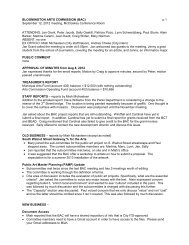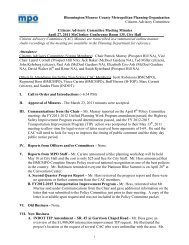Peak Oil Task Force Report - City of Bloomington - State of Indiana
Peak Oil Task Force Report - City of Bloomington - State of Indiana
Peak Oil Task Force Report - City of Bloomington - State of Indiana
You also want an ePaper? Increase the reach of your titles
YUMPU automatically turns print PDFs into web optimized ePapers that Google loves.
2. Housing will occupy an everincreasing proportion <strong>of</strong> personal income.<br />
The Transportation chapter illustrated the way in which increasing oil prices will consume<br />
more and more <strong>of</strong> personal income. The story is the same with housing. Absent efficiency<br />
improvements, heating, maintenance, and monthly housing<br />
costs will consume a larger share <strong>of</strong> household budgets and<br />
may push people toward lower‐quality housing choices at<br />
the same time that auto transportation costs increase<br />
dramatically.<br />
3. Big houses and low occupancy translates into<br />
great inefficiency.<br />
As described above, <strong>Bloomington</strong> residents, like most<br />
Americans, tend to live in large spaces with few occupants.<br />
As fuel becomes scarcer and electricity prices rise, it will<br />
become increasingly difficult to heat and cool these large spaces. Many families will likely<br />
face tough choices such as downsizing to a more moderately‐sized space, doubling up<br />
households, closing <strong>of</strong>f unused rooms and/or remodeling underutilized areas to create<br />
living space for additional household members who can contribute to the cost <strong>of</strong> utilities<br />
and maintenance. It is likely that large and inefficient homes will not hold their worth and<br />
those who have their net worth tied up in such houses may be disproportionately affected.<br />
4. No incentives for landlords to make rental units energy efficient.<br />
For the most part, when renters assume the cost <strong>of</strong> their utility bills, landlords don’t have<br />
much financial incentive to make their rentals more energy efficient. This is known as a<br />
“split incentive.” Owners don’t make efficiency investments because it’s the renters who<br />
pay the energy bills. And renters don’t make investments in property they don’t own. The<br />
result is housing that wastes energy and costs more than it should. Since fully 65% <strong>of</strong> all<br />
housing units in <strong>Bloomington</strong> are renter‐occupied, renters living in inefficient units will<br />
face considerable hardship due to peak oil.<br />
Source: Natural Resources Defense Council<br />
<strong>Report</strong> <strong>of</strong> the <strong>Bloomington</strong> <strong>Peak</strong> <strong>Oil</strong> <strong>Task</strong> <strong>Force</strong> 161









